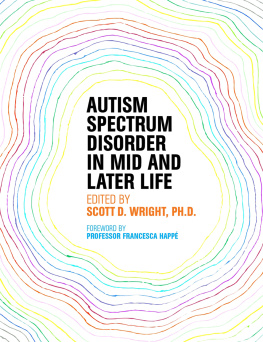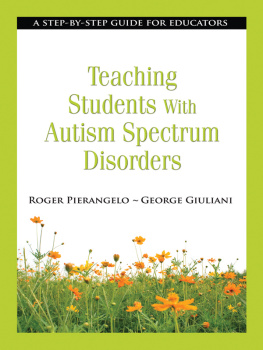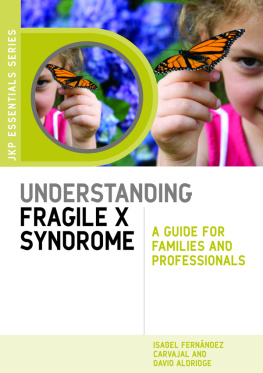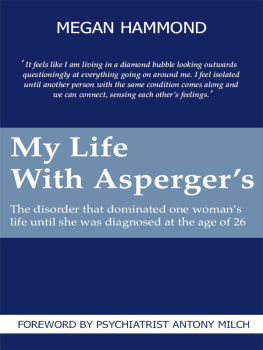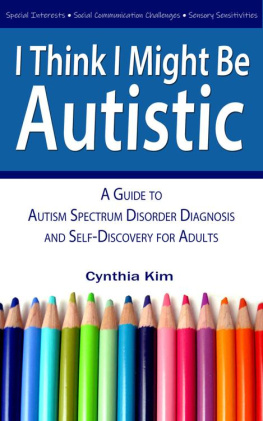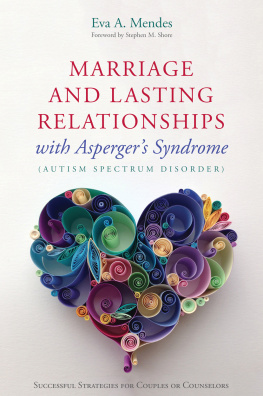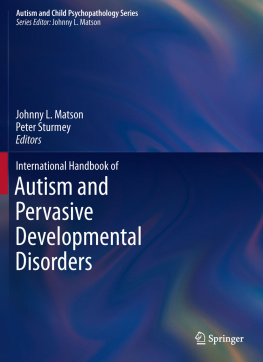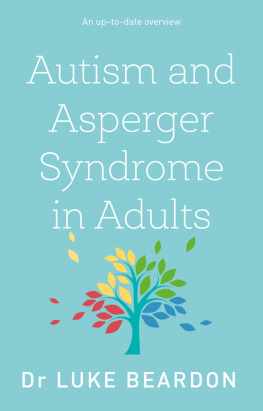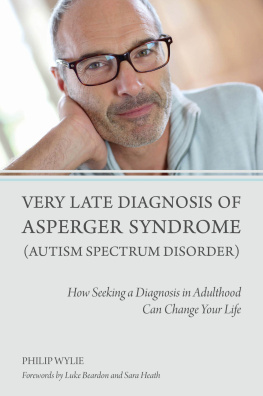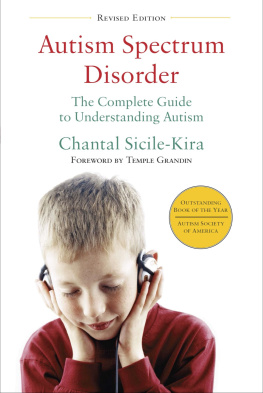
AUTISM SPECTRUM DISORDER
IN MID AND LATER LIFE
of related interest
Autism Spectrum Disorders Through the Life Span
Digby Tantam
ISBN 978 1 84310 993 8 (Hardback)
ISBN 978 1 84905 344 0 (Paperback)
eISBN 978 0 85700 511 3
Older Adults and Autism Spectrum Conditions
An Introduction and Guide
Wenn Lawson
Foreword by Carol Povey
ISBN 978 1 84905 961 9
eISBN 978 0 85700 813 8
Crime and Autism Spectrum Disorder
Myths and Mechanisms
Neil Brewer and Robyn L. Young
ISBN 978 1 84905 404 1
eISBN 978 0 85700 773 5
Marriage and Lasting Relationships with Aspergers Syndrome (Autism Spectrum Disorder)
Successful Strategies for Couples or Counselors
Eva A. Mendes
Foreword by Stephen M. Shore
ISBN 978 1 84905 999 2
eISBN 978 0 85700 981 4
Women and Girls with Autism Spectrum Disorder
Understanding Life Experiences from Early Childhood to Old Age
Sarah Hendrickx
Foreword by Judith Gould
ISBN 978 1 84905 547 5
eISBN 978 0 85700 982 1
Helping Adults with Aspergers Syndrome Get & Stay Hired
Career Coaching Strategies for Professionals and Parents of Adults on the Autism Spectrum
Barbara Bissonnette
ISBN 978 1 84905 754 7
eISBN 978 1 78450 052 8
AUTISM SPECTRUM DISORDER
IN MID AND LATER LIFE
Edited by Scott D. Wright, Ph.D.
Foreword by Professor Francesca Happ

Jessica Kingsley Publishers
London and Philadelphia
First published in 2016
by Jessica Kingsley Publishers
73 Collier Street
London N1 9BE, UK
and
400 Market Street, Suite 400
Philadelphia, PA 19106, USA
www.jkp.com
Copyright Jessica Kingsley Publishers 2016
Foreword Copyright Professor Francesca Happ
All rights reserved. No part of this publication may be reproduced in any material form (including photocopying or storing it in any medium by electronic means and whether or not transiently or incidentally to some other use of this publication) without the written permission of the copyright owner except in accordance with the provisions of the Copyright, Designs and Patents Act 1988 or under the terms of a licence issued by the Copyright Licensing Agency Ltd, Saffron House, 610 Kirby Street, London EC1N 8TS. Applications for the copyright owners written permission to reproduce any part of this publication should be addressed to the publisher.
Warning: The doing of an unauthorised act in relation to a copyright work may result in both a civil claim for damages and criminal prosecution.
Library of Congress Cataloging in Publication Data
Names: Wright, Scott D.
Title: Autism spectrum disorder in mid and later life / edited by Scott D.
Wright ; foreword by Francesca Happe.
Description: London ; Philadelphia : Jessica Kingsley Publishers, 2016. |
Includes bibliographical references and index.
Identifiers: LCCN 2015033306 | ISBN 9781849057721 (alk. paper)
Subjects: LCSH: Autism spectrum disorders.
Classification: LCC RC553.A88 A985 2016 | DDC 616.85/882--dc23 LC record available at http://lccn.loc.gov/2015033306
British Library Cataloguing in Publication Data
A CIP catalogue record for this book is available from the British Library.
ISBN 978 1 84905 772 1
eISBN 978 1 78450 037 5
To all aging individuals on the autism spectrum and the families, friends, professionals, communities, and countries that join together to build a future of promise, respect, and support. Building a bridge takes both sides to work together.
CONTENTS
FOREWORD
Francesca Happ
This is an important book on an essential topic. Even five years ago, such a book could not have been written; it would have been impossible to gather together so many and diverse chapters by leading researchers and writers on the topic of ageing in autism spectrum disorder (ASD). It would be wonderful if, five years from now, such a book was also impossible, because the research literature on ASD and ageing was so extensive that only volumes on specific subtopics were feasible. At this important time, when research on ageing in ASD is just beginning, Scott Wright has managed to gather together a wonderful array of perspectives: cultural as well as biological; self-advocacy alongside clinical and research voices; family, community and societal viewpoints.
My own interest in ASD ageing arose at the end of the last decade when, as part of the DSM-5 Neurodevelopmental disorders workgroup, I decided Id better read up about later life changes in ASD symptomatology. I was shocked to find there was nothing to read; no empirical studies of behavioural changes, mental or physical health, nothing on wellbeing in adults with ASD growing old. At the same time, personal circumstances led me to spend time on a ward of 70- and 80-year-olds, visiting a previously fit and healthy, and still highly intelligent and charming, older relative with a badly broken leg. I was again shocked; while some staff were wonderful, others clearly struggled to see the individuals within these aged and damaged bodies. Physically dependent on over-stretched staff, these elderly neurotypicals had to use every communicative and social skill they could, to fit into an unfamiliar and intrusive environment. Those without relatives visiting were even more powerless. It struck me, viscerally, how incredibly hard such a hospital stay would be for many of the adults with ASD I knew. From the requirement to make small talk on a shared ward, and the need to communicate under stress, to coping with the sensory onslaught of bright strip lights, noise and smells; this could be as close to an everyday hell for some people with ASD as I could imagine. The only hope would be that relatives could explain to staff the different needs and mitigate some of the stress. No wonder parents of those with ASD live every day with the burning question; what will happen to my son/daughter when I am gone?
So my interest in ASD and ageing was driven by shock and worry. But once I started to think about the topic as a researcher, I realised that the unknown may also bring positive surprises. It is possible, for example, that having spent a lifetime developing compensation strategies to fit in to a neurotypical world, many people with ASD might have built up cognitive reserve for old age. If doing Sudoku puzzles can slow mental deterioration in neurotypical old age, imagine what the mental arithmetic of laboriously figuring out social interactions every day might do for adults with ASD as they age. And wouldnt it be wonderful if, alongside the efforts for early intensive intervention to optimise the learning potential of very young children with ASD, we could develop intensive intervention for older adults with ASD, to maximise quality of life in their later years? Of course, we would need to know what a good life looks like for elderly people with ASD, and so the emphasis in this volume on collaboration between researchers and those with ASD is extremely welcome.
In many countries and cultures, the elderly are not respected, and so the elderly with ASD are at risk of a double stigma. Scott Wright advocates in this volume a bioecological approach, considering the bidirectional fit between the person and the environment. I now realise that what I was witnessing in the hospital ward was what Wright describes in his introduction, that the ability to marshal support was a key behavioural coping strategy in later life. The physical and sometimes mental infirmity of old age means, for each of us, a greater reliance on others. New technology has the promise of breaking down physical barriers to discourse and friendship, if society can respond. As more and more of us survive to old age, we will need to find new ways to live fruitful and happy lives; creating and respecting niches for neurodiversity will be an important part of that better future. This volume is a vital first step towards a better future for people with ASD growing old.
Next page
